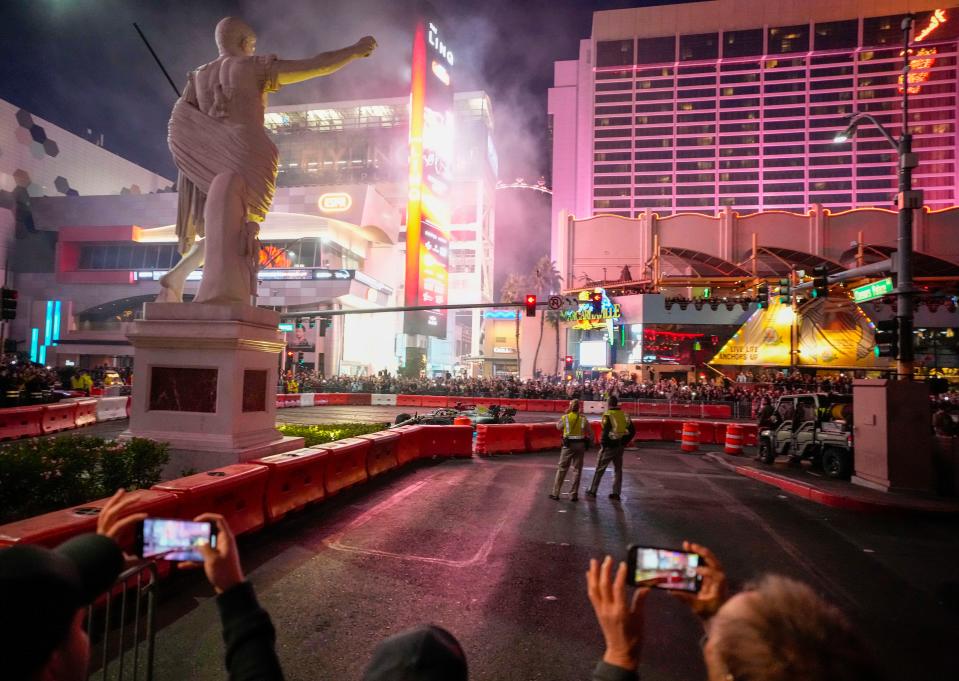It took Formula 1 way too long to realize demand for Las Vegas was being vastly overestimated
The Las Vegas Grand Prix is set for this Saturday, Nov. 18 (free practice begins on Thurs.), with a 10 p.m. PT start time. This spectacle is sure to amaze onlookers. After all, Formula 1 spent the most money on this race - $500 million - than any other they've held this year.
Yes, it sure will be something to behold. The only problem is, it seems no one will be there to behold it. The half-billion-dollar venture has hit a bump with less than a week before it's supposed to take place.
The main issue, demand.
When the event was announced, it was clear that it was not supposed to bring in new Formula 1 fans or create more American interest. Initial entry fees for the Grand Prix were around $2,000 on the low end. The average price was around $7,000. Hotels saw their rates soar in anticipation of the global event, tailor-made for international high-rollers.
On Nov. 3, the CEO of the Las Vegas Grand Prix made a rather bold claim, assuming that by the time of the event, "we will be sold out." The opposite has happened. Even as the event drastically lowers its prices and hotels nearby lower their rates, the Las Vegas Grand Prix is drawing almost zero attention.
How much have prices been reduced?

KTNV Las Vegas reports that ticket prices have been cut by nearly 60 percent, but it hasn't just been tickets. Hotels near the event have slashed their prices up to 80 percent for nights leading up to the race.
Furthermore, the Grand Prix initially charged fees to any business or hotel that had a view of the race, threatening to build statues in the sightlines of any building that had a view and did not pay. Those fees eventually came down, but it set a bad tone for the city. Never mind all the construction that took place as well near the end of the Strip, forcing large traffic jams across the city for weeks.
Another factor that could be playing into the lack of interest is the time. The race does not start until 10 p.m. local time. People do not come to Las Vegas just to watch a race that holds no significant value on the end-of-season results, considering Max Verstappen secured a championship long ago at this point. They come to gamble, drink, enjoy the nightlife, not have the ear drums burst by cars nearing the sound barrier and smell burnt rubber.
What were entry prices for other F1 events in 2023?
Tickets for Formula 1 races often cost a pretty penny. An average ticket costs about $600. The cheapest places to watch a race include Hungary, Imola, and Austria. If you stay in the cheapest hotels, buy the cheapest tickets, and budget appropriately for travel expenses, those venues will still cost you around $370-$400.
The tickets themselves at those cost as low as $40 for single day entry. Vegas still comes in higher than those figures, asking for $110 at least for a one-day pass. The three-day pass still costs upwards of $850, while the same pass for the Hungarian Grand Prix will cost you $125-$180 as of Wednesday, November 15.
Prices for the Vegas event may have come down a lot, but Formula 1 and Liberty still hope they can earn back their initial investment and then some with ticket prices still relatively high.
Hasn't F1 held races in Vegas before?
Yes, in 1981 and 1982, Caesars Palace hosted its own Grand Prix, using a big chunk of a parking lot for the course. It also did not go very well. Even the former president of the Caesars Palace Grand Prix referred to the five years leading up to the event as an "absolute nightmare."
This race is different though. F1 has been building this race up for the better part of two years. It was supposed to be a massive event that would bring in billions of dollars. While the president and CEO of Formula 1's parent company Liberty Greg Maffei has claimed that the Las Vegas Grand Prix will be able to earn back its $500 million investment, most people aren't too sure about the authenticity of that statement. At the very best, there still won't be much room for profit.
Formula 1 wants Las Vegas to become a fixture of the F1 schedule for years to come, and it doesn't seem as though this hiccup will dispel those desires. If anything, they'll likely just come back in the future with lower expectations from the get-go.
F1 news: Here's how much a Formula 1 race car costs
This article originally appeared on USA TODAY: Formula One finally realizes demand for Las Vegas was overestimated

